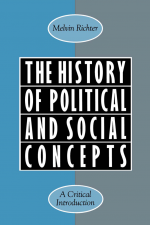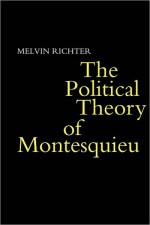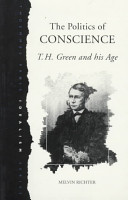Click here full-text of the interview article from History of Concepts 4 (2008), pp. 226-238.
Why Concepts Matter: Translating Social and Political Thought
Edited by Martin J. Burke, The City Univerity of New York (CUNY) and Melvin Richter, The City University of New York (CUNY)
Translation is indispensible to transmissions of knowledge across time and place; to understanding how and what others think. There is a vast stock of theories about how to translate, deriving mainly from controversies about sacred and literary works. Yet there is little discussion of the distinctive issues involved in translating political and social thought. This volume breaks new ground by focusing on them. Thirteen scholars consider problems arising from the study of translation and the cultural transfer of texts. Especially novel is the application of these issues to two relatively new disciplines: translation studies, and the history of concepts (Begriffsgeschichte). This volume opens a discussion of what and how each of them can learn from, and contribute to, the others.
GET THIS BOOK IN PRINT (No eBook available as of 3/2014)
Article on “Despotism” Accessible Via Google Books Preview
This encyclopedia entry on Oriental Despotism was recently published The Classical Tradition,” eds. Anthony Grafton, Glenn Most, Salvatore Settis, (Cambridge, Mass.:Harvard University Press, 2010). It can be accessed conveniently in its entirety via Google Books here. Select “Contents,” then “Contributors” and scroll to page 261 in the preview.
Dictatorship in History and Theory: Bonapartism, Caesarism, and Totalitarianism
H-France Review Vol. 4 (November 2004), No. 110
Peter Baehr and Melvin Richter, Eds. Dictatorship in History and Theory: Bonapartism, Caesarism, and Totalitarianism. Cambridge and New York. Cambridge University Press. 2004. 308 pp. Notes. $65.00 U.S. (hb) ISBN 0-521-82563-1.
Review by David Higgs, University of Toronto.
This collection of essays derives from a conference held at Hunter College of the City University of New York in April 1999 with the generous sponsorship of the German Historical Institute, Washington, D.C. Most of the speakers were established scholars including two professors emeriti. Historians were in a minority among teachers of political sociology, political theory, political thought, and political science. One might well enquire why the book should be reviewed for H-France since its major themes are the concepts of German political philosophers engaging with political vocabulary. However, albeit not in fact the central focus of the essays, Bonapartism is addressed by a number of the contributors, and especially by Isser Woloch in the lead article.
As in all collections there are disparities in approach and focus and the editors have grouped the essays under three headings. These are: I. Bonapartism and its Contemporaries, II. Bonapartism, Caesarism, Totalitarianism: Twentieth-Century Experiences and Reflections, III. Ancient Resonances.
The date chosen for the conference was to commemorate Napoleon Bonaparte’s coup. As the title of the volume denotes, the historical experience of that individual has entered political language and conceptualization. Part one has the most to offer on the way contemporaries tried to find meaning in the activity of Bonaparte, and his relative who ruled as Napoleon III. There has always been a brisk market in Napoleonic bibliography: one thinks of Walter Scott who composed a life of Napoleon with the specific aim of cashing in on an avid market. Victor Hugo`s Napoleon le Petit appeared in London in 1852 before the chief figure of the Second Empire had had an opportunity to reveal the full extent of his talents and failings. Marx in due course would analyse the class basis of the regime immortalized by writers and musicians. In the 1850s and 1860s commentators reached back to classical history to decide that Caesarism was an appropriate term for the activities of leading members of the Bonaparte family.
French contemporary history was sufficiently familiar to many nineteenth-century Europeans, and particularly to German speakers, that it offered examples for discussions of political terminology and nation building. In particular, intellectuals discussed dictatorship in its historical setting and also as a theory of political life. This continued throughout the twentieth century. One of the best known examples was that of Carl Schmitt in 1921, who distinguished the practices of modern Bonapartism from Caesarism. Sensitive to contemporary history, Schmitt joined the Nazis in May 1933. Alfred Cobban took issue with Schmitt’s formulations as expressed in the second edition of 1928 of Die Diktatur in a work published on the very eve of the Second World War. Cobban’s book was entitled Dictatorship: Its History and Theory (1939), and he discussed both Bonapartism and Schmitt, but none of the authors in the collection under review engage with his arguments. Cobban also discussed Caesarism in a chapter towards the end of his study, noting that Julius Caesar was a precursor to Augustus, who set up an empire that lasted almost 500 years. Cobban argued elsewhere that many salient characteristics of modern France were strongly defined under the Second Empire.
Twentieth-century commentators have dealt with the terminology of political forms. There is a great deal in this collection about Max Weber, less about Gramsci, and an interesting article about Hannah Arendt on totalitarianism and dictatorship. Jack Hayward has an intriguing article on the way the French Left from the start of the Fifth Republic tried to establish a parallel with Bonapartism and Gaullism in order to disparage the general. The main readership for this volume will be political scientists interested in German-language analysis of concepts of governance, with some attention to France and the classical world.
This book would be totally bewildering for undergraduates seeking to understand Bonapartism. Frédéric Bluche’s discussion of the origins of the authoritarian Right in France from 1800 to 1850 is not invoked.[1] There is little here to help the student who wants to know who was involved in what came next in France after the Second Empire. John Rothney’s fine 1969 study remains the best account of the transition to the practice of Bonapartism after the end of the Second Empire.[2] Due to overlapping publication there is no reference to the points raised in Nathalie Petiteau’s wide-ranging study of the relationship of a Bonapartist mythology derived from the first emperor and the work of historians.[3]
LIST OF ESSAYS
Part I: Bonapartism to Its Contemporaries
* Isser Woloch, “From Consulate to Empire: Impetus and Resistance”
* T.C.W. Blanning, “The Bonapartes and Germany”
* David E. Barcley, “Prussian Conservatives and the Problem of Bonapartism”
* Melvin Richter, “Tocqueville and French Nineteenth-Century Conceptualizations of the Two Bonapartes and Their Empires”
* Terrel Carver, “Marx’s Eighteenth Brumaire of Louis Bonaparte: Democracy, Dictatorship, and the Politics of Class Struggle”
* Sudhir Hazareesingh, “Bonapartism as the Progenitor of Democracy: The Paradoxical Case of the French Second Empire”
Part II: Bonapartism, Caesarism, Totalitarianism: Twentieth-Century Experiences And Reflections
* Peter Baehr, “Max Weber and the Avatars of Caesarism”
* Benedetto Fontana, “The Concept of Caesarism in Gramsci”
* John McCormick, “From Constitutional Technique to Caesarist Ploy: Carl Schmitt on Dictatorship, Liberalsim and Emergency Powers”
* Jack Hayward, “Bonapartism and Gaullist Heroic Leadership: Comparing Crisis Appeals to Impersonated People”
* Margaret Canovan, “The Leader and the Masses: Hannah Arendt on Totalitarianism and Dictatorship”
Part III: Ancient Resonances
* Claude Nicolet, “Dictatorship in Rome”
* Arthur M. Eckstein, “From the Historical Caesar to the Spectre of Caesarism: The Imperial Administrator as Internal Threat”
NOTES
[1] Frédéric Bluche, Le Bonapartisme: Aux origines de la droite autoritaire (1800-1850) (Paris: Nouvelles Editions Latines, 1980).
[2] John Rothney, Bonapartism after Sedan (Ithaca: Cornell University Press, 1969).
[3] Natalie Petiteau, Napoléon de la Mythologie à l’histoire (Paris: Seuil, 1999).
David Higgs
University of Toronto
dhiggs@chass.utoronto.ca
Copyright © 2004 by the Society for French Historical Studies, all rights reserved. The Society for French Historical Studies permits the electronic distribution for nonprofit educational purposes, provided that full and accurate credit is given to the author, the date of publication, and its location on the H-France website. No republication or distribution by print media will be permitted without permission. For any other proposed uses, contact the Editor-in-Chief of H-France.
H-France Review Vol. 4 (November 2004), No. 110
ISSN 1553-9172
Publications
Towards a lexicon of European political and legal concepts: A comparison of begriffsgeschichte and the ‘Cambridge school’
The first step in planning a lexicon of European political and legal concepts is to decide upon how it is to be organised. Among the principal alternatives are the formats of three German reference works on the history of concepts (Begriffsgeschichte) and the methods associated with John Pocock and Quentin Skinner. Although these German and Anglophone styles are often regarded as incompatible, on closer inspection, they turn out to be in many respects complementary, as Skinner has recently acknowledged. What would such a format look like? Is it possible to overcome the difficulties inherent in attempting a lexicon combining continental and Anglophone political and legal concepts?
Purchase Article
The History of Political and Social Concepts: A Critical Introduction
Description
Since the 1960s, German scholars have developed distinctive methods for writing the history of political, social, and philosophical concepts. Applied to France as well as Germany, their work has set new standards for the historical study of political and social language, Begriffsgeschichte . The questions these scholars address, and the methods they apply systematically to a broad range of sources, differ as much from the styles of Hegel, Dilthey, and Meinecke as from those of A.O. Lovejoy, J.G.A. Pocock, and Quentin Skinner.
Begriffsgeschichte treats political language neither as autonomous discourse, nor as the product of ideology, social structure, or elite manipulation. Although conceptual historians agree that the field of action is defined by language, they place concept formation and use within historical contexts. By surveying political and social discourses systematically, this genre traces how the great modern revolutions have been conceptualized in sharply contested forms by competing political and social formations, as well as by individual thinkers. Combining intellectual with social history, historians of concepts track linguistically the advent, mentalities, and effects of modernity.
In The History of Political and Social Concepts , Melvin Richter analyzes the theories which have generated conceptual history, and their reinterpretation of key concepts such as Max Weber’s three types of legitimate Herrschaft , and that of civilitÖè in France. What is it that we know when we learn the history of a concept? What difference does it make that we know it? After assessing the programs and achievements of Begriffsgeschichte , the author argues the need for an analogous project to chart the careers of political and social concepts used in English-speaking societies. Addressed not only to historians of political and social thought, this work will interest students and scholars of political culture, social historians, and historians of ideas, historiography, law, language, and rhetoric.
“Closely related to the history of ideas and of culture, Begriffsgeschichte (the history of concepts) is distinctive in focusing on how specific terms change their meaning over time. Richter introduces English-speaking readers to different approaches to this subject that have developed, especially in Germany, in recent decades.”–Choice
“Lucidly written and judicious in its evaluations, this book will reach beyond German Studies, drawing the attention of non-German specialists to important theoretical developments in the Federal Republic.”–German Politics and Society
“Richter’s contribution is both persuasive and welcome.”–Times Literatry Supplement
“Richter’s book is admirably perceptive, precise, balanced, lucid and concise”–History of European Ideas
“Lucidly written and judicious in its evaluations, this book will reach beyond German Studies, drawing the attention of non-German specialists to imprtant theoretical developments in the Federal Republic.”–German Politics and Society
Get this book
The Political Theory of Montesquieu
From the Publisher
This volume makes available in an English translation the most significant part of Montesquieu’s political, social and legal theory. About two-thirds of the volume has been translated from the Spirit of the Laws, not redone in English since the eighteenth century. That version was notoriously inadequate: Montesquieu’s key terms were not rendered consistently; often his meaning was distorted by giving the nearest English eighteenth-century legal or institutional equivalent. Finally, English usage has changed so much that the eighteenth-century translation makes Montesquieu seem both quaint and obscure. This volume also includes substantial selections from the Persian Letters and the Considerations on the Causes of the Romans; Greatness and Decline. Although adequate translations of these works exist, it seemed advisable to maintain intellectual and stylistic consistency by providing English versions on the same principles as the Spirit of the Laws.
Get this book
The Politics of Conscience
From the Publisher
Few thinkers exerted a greater influence upon British thought and public policy between 1880 and 1914 than T. H. Green. In his appraisal Richter applies to Green, usually studied as a philosopher, the techniques of analysis taken from sociology and the history of ideas. The result is important both as a study of a man who considerably affected the thought of his time and also as a contribution to the social and intellectual history of Victorian England. The chapter headings include: Idealism and the Crisis of the Evangelical Conscience; Metaphysical Foundations; the Principles of Political Obligation; From the Old Liberalism to the New: Private Property, Capitalism and State Intervention; and The Life of Citizenship.
Reviews
Table of Contents
Bibliographic information
| Title | The politics of conscience: T.H. Green and his age Thoemmes press idealism series Issue 4 of Idealism Series |
| Author | Melvin Richter |
| Edition | reprint, illustrated |
| Publisher | Thoemmes Press, 1996 |
| ISBN | 1855064871, 9781855064874 |
| Length | 415 pages |
| Subjects | Great Britain Green, Thomas Hill, 1836-1882 Oxford (England) Philosophers Philosophy / General Philosophy / Metaphysics Philosophy / Political Political Science / History & Theory Political science |



